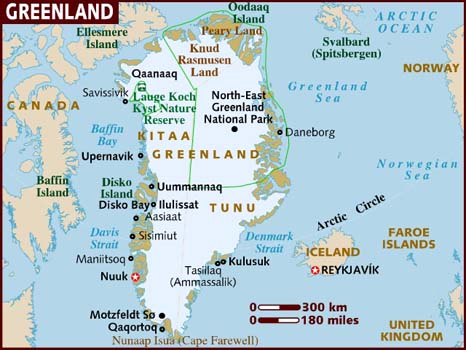Referendum set to give Greenland more autonomy
 Copenhagen/Nuuk, Greenland - Voters in Greenland went to the polls Tuesday to vote in a referendum on gaining more autonomy within Denmark.
Copenhagen/Nuuk, Greenland - Voters in Greenland went to the polls Tuesday to vote in a referendum on gaining more autonomy within Denmark.
A clear majority of the approximately 39,000 voters was expected to approve the plan, by voting "aap" or "yes" to the plan.
The Arctic island has had home rule since 1979. If the referendum is approved, Greenland aims to secure partial control over its natural resources and take greater charge of justice and legal affairs.
Also, Greenlandic - an Inuit language - is set to become the official language on the world's largest island. Additionally, Greenlanders were to be recognized as a people.
Polls opened at 9 am (1200 GMT) and were to close at 8 pm (2300 GMT). Election officials expected to present results Wednesday.
The referendum's main critics were the opposition Democrats, who draw support from Danish voters in Greenland and scored some 22 per cent in the November 2005 local legislative elections.
A poll of 1,000 voters published on the eve of the vote suggested that only 15 per cent of voters would vote "naamik," or "no," while 61 per cent favoured more autonomy, according to the online edition of the Sermitsiaq newspaper.
One in five voters were undecided, while 5 per cent said they would abstain.
With a likely yes vote, the expanded home rule would take effect starting June 21, 2009, the 30th anniversary of the existing home rule bill.
Greenland's resources include potential reserves of oil and gas, as well as water power, zinc and diamonds.
The current mainstay is shrimp and halibut fishing, although these sectors need to become more efficient, Christen Sorensen of the University of Southern Denmark, an expert on Greenland's economy, recently told Deutsche Presse-Agentur dpa.
Under the terms agreed upon between the parliaments of Denmark and Greenland, Danish subsidies, known as the block grant, worth 3.2 billion kroner (542 million dollars), are to remain.
Potential oil revenues, if oil were to be found, would be divided between Denmark and Greenland and deducted from the block grant.
Denmark would continue to manage foreign affairs and monetary policy, even though Greenland has become more active in the Arctic region and maintains special ties with the European Union. (dpa)